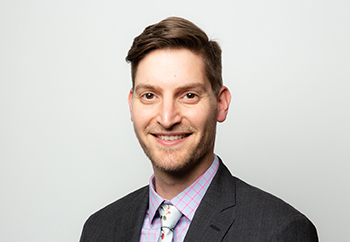Haim Abraham (SJD 2020)

The Tortious Liability of States for Combatant Activities (Thesis)
Graduate supervisor: University Professor Arthur Ripstein, Howard Beck, Q.C. Chair
Awards: U of T Faculty of Law Doctoral Fellowship (2015); U of T Faculty of Law, International Human Rights Fellowship (2016); Vanier Canada Graduate Scholarship (2017), U of T School of Graduate Studies, Doctoral Completion Award (2019); Social Sciences and Humanities Research Council Insight Grant (2019), awarded pursuant to a peer-reviewed nationwide competition for the Tort Law in Social Context Initiative (co-applicant with Sophia Moreau, Zoë Sinel and Jean Thomas)
Haim Abraham (SJD 2020) didn’t envision a career in academia until, while clerking in the office of the State Attorney of Israel, he came across some puzzling questions on state’s liability in tort that he wanted to research.
“I thought that an SJD would be a wonderful opportunity to explore these questions in depth,” says Abraham, an assistant professor in the Faculty of Laws, University College, London.
Abraham’s focus is tort law and his thesis explored states’ responsibilities in the presence of armed conflicts. It’s a topic that he is expanding into a book, Tort Liability in Warfare: Civilians’ Rights and States’ Wrongs, forthcoming in 2025 from Oxford University Press. He loves doing research, and the U of T Law Journal recently accepted a related paper of his, a theoretical analysis of when and why it’s possible to impose liability on states for torts inflicted extraterritorially.
“Generally speaking, it should be possible to bring tort claims against a state in its own courts during conflicts,” Abraham says. “Tort law is an important mechanism for ensuring accountability for misuse and abuse of public power, and when tort law is made unavailable it’s important to understand what we’re losing in the process.”
U of T's Faculty of Law became the launching pad for Abraham’s academic career, and he can’t say enough good things about his experiences there.
“The people are amazing,” Abraham says. “I had a great committee; they were very supportive through the process of writing. When I sent a draft to my supervisor, Arthur Ripstein, he’d reply within minutes or hours. It’s incredible to have a supervisor who reads your work in depth and responds so quickly. My committee members, David Dyzenhaus and Ernest Weinrib, always provided kind and helpful feedback, and I cannot imagine a better committee to have.
“Professors were wonderful about giving advice, suggesting conferences to attend, where to apply for jobs and which ones to accept or decline. There were so many wonderful people who were happy to chat and invite us places to meet others. These are people who are top notch in their field and they always had time for us.”
He also appreciated having a space just for SJDs, a place where they could gather, relax and build community.
“We could chat, share ideas and plans and feel centred,” he says. “It was priceless.”
Overall, “the Faculty created a fantastic, warm space and nourished and assisted us to grow as academics.”